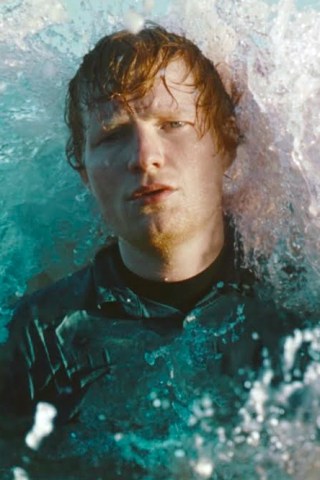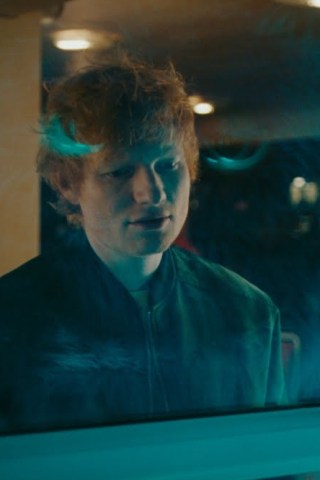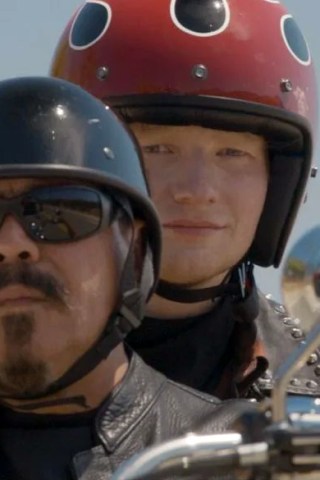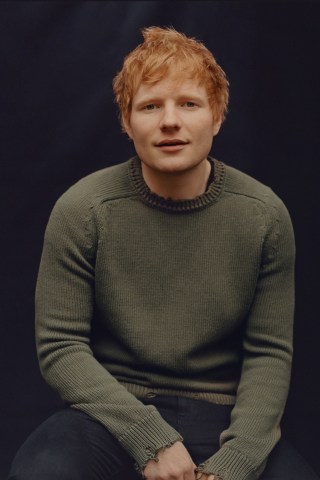Ed Sheeran on Winning His Lawsuit, Losing His Best Friend, and Narrowly Avoiding an Early Retirement
Grammy-winning superstar also performs several songs off his new album, “-”
May 10, 2023It’s been less than two years since Ed Sheeran’s last visit to the Stern Show, but with all the ups, downs, twists, and turns he’s been through two years might as well be a lifetime. The Grammy-winning superstar’s recent peaks have been Mount Everest-esque, from the birth of his second daughter (Jupiter Seaborn) to the release of both a critically acclaimed new album (“-,” pronounced “Subtract”) and an all-encompassing docuseries (“The Sum of It All”). But the valleys have been gut-wrenchingly low and filled with so much darkness and despair that for awhile the 32-year-old singer-songwriter didn’t know which way was up.
In February of 2022, Ed’s best friend and longtime collaborator Jamal Edwards passed away tragically at the age of 31. Around the same time, Sheeran’s then-pregnant wife Cherry Seaborn received a scary cancer diagnosis. Mercifully, Cherry had her cancerous tumor removed and was able to successfully give birth to their child, but between her health scare and the loss of Jamal, Ed was shaken to his core. It affected not only his songwriting — his new album is filled with songs about grief — but also his underlying personality.
“It definitely does strip away some carefree jokey-ness. I still like to have fun, but I’m in my head a lot,” Ed said, explaining he’s still processing Jamal’s death but has found comfort in his family, his music, and regular therapy, which his wife first recommended.
Sheeran also took comfort in a win he scored last week when a Manhattan jury sided with him in a copyright infringement lawsuit brought on by the family of Ed Townsend, who co-wrote Marvin Gaye’s 1973 hit “Let’s Get It On.” It was a victory eight years in the making for Sheeran, who had been accused of stealing the song’s rhythm and chord progression for his 2014 chart-topper “Thinking Out Loud.” As part of his successful defense, Sheeran put on a concert for the jury and played them a wide swath of songs with the very same chord progressions written by other artists.
“What songs did you play?” Howard wondered on Wednesday.
Ed answered Howard’s question with an encore performance of the courtroom medley, which began with his own song “Thinking Out Loud” and transitioned into staples like Rod Stewart’s “Have I Told You Lately That I Love You,” Shania Twain’s “You’re Still the One,” and The Temptations’ “My Girl.”
“There were 101 songs [in the medley], and that was like scratching the surface,” Sheeran told Howard. “Yes, it’s a chord sequence that you hear on successful songs, but if you say that a song in 1973 owns this, then what about all the songs that came before? We found songs from like the 1700s that had similar melodic stuff.”
“No one’s saying that songs shouldn’t be copyrighted, but you just can’t copyright a chord sequence—you just can’t,” he added.
The verdict was a victory for songwriters everywhere, and on a personal level Ed was happy to put the lawsuit behind him. “I’m really glad it’s over, man,” he said, explaining the court proceedings caused him to miss important events like his own grandmother’s funeral. “It’s a shame. I won’t get that time back and she was a great woman,” Sheeran said.
Why didn’t he settle like other artists might have done in his place?
“[Making music] is the thing I worked my entire life to do, and to have someone … diminish it and just say that you’ve stolen it, I really felt like I had to take a stand,” he told Howard.
At the end of the day, the biggest winners may be the millions of Ed Sheeran superfans who feared an unfavorable verdict might cause the singer-songwriter to seek early retirement. As it turned out, their fears were well founded. “I really think I would’ve [quit music if I would’ve lost] because it just takes the joy out of it to sit down and say you can’t use a G chord to a C chord because someone did it in the ‘60s,” Ed concluded.
‘Salt Water’ and an Emotional New Album
Sheeran’s new album “-” has received praise from both fans and critics alike, and Ed was grateful for its warm reception. “It’s the most connected I’ve felt to my fan base in years,” he said, adding, “I write music because I have to, and I release music because I want to connect to people.”
While Ed was nervous “-” might not sell as well as his previous efforts, he told Howard he didn’t set out to make this a commercial record. “There’s nothing on this album that’s gonna be like banged out at the gym when you’re doing reps or that you’re gonna put on the club when you’re dancing with your mate,” Sheeran said. “I feel like this album is quite a solitary record.”
He compared it to Bruce Springsteen juxtaposing a smash-hit album like “Born in the U.S.A.” with a quieter, more contemplative effort like “Nebraska.” “There’s something in what you leave behind,” Sheeran said, adding, “‘÷’ is my most commercially successful album, but I imagine ‘-’ will be the one people have connected to most [and] therefore is the most important to them in 30 years’ time.”
Howard himself felt a deep connection to the new track “Salt Water,” which depicts the finals moments of someone’s life. “I started crying. The song really got me,” he told Ed, explaining it reminded him of his late father.
Sheeran then performed “Salt Water” live in the Stern Show studio for Howard and his listeners.
Turning Failures Into Success
Few artists can say they’ve won four Grammys and sold over 150 million records. Even fewer can say they’ve done it by the age of 32. But Sheeran assured Howard his incredible successes as a singer-songwriter had less to do with natural born talents than with the hard work he put into his craft as a teenager.
Exhibit A: Ed told Howard every major record label passed on him — twice — before he made his breakthrough. Exhibit B: He had Howard go on YouTube and play “Addiction,” a song Ed wrote and recorded when he was just 14.
“You can hear that I didn’t have talent [back then]. I really didn’t,” Sheeran said while clutching his acoustic guitar tightly and listening to a younger version of himself stretch for the high notes. “We can definitely turn it off now,” he laughed a few seconds later.
“This is what I play to kids,” he told Howard. “I’m like, ‘Look, this is me at 14, and I wrote [my debut single] ‘The A Team’ at 18 … In four years, I learned harmony, I learned how to sing in tune, I learned how to perform, I learned how to do it in time—you can do it.’”
So, how did Ed progress so quickly? By failing, repeatedly.
“You learn nothing from success. Nothing. You learn everything from failure,” Sheeran said. “No one talks about failure anymore … No one goes, ‘What did we learn about this?’ … But success happens from failing hundreds of times.”
How Eminem Helped His Stutter
Ed went through speech therapy at a young age after a painful medical procedure to remove a birthmark on his face left him with a stutter. However, it wasn’t the speech therapy that ultimately helped him overcome the impediment. It was Eminem’s seminal 2000 rap album “The Marshall Mathers LP,” which Ed’s uncle bought for him when he was just nine. “He just said to my dad, ‘This guy is the next Bob Dylan. You gotta let him listen,’” Ed recalled. “And by learning that record — and rapping it back to back to back to back — it cured my stutter.”
As fate would have it, Sheeran would eventually get an opportunity to not only befriend the rapper and record with him but also perform the hit “Stan” alongside Eminem last year as he was inducted into the Rock and Roll Hall of Fame.
“I remember getting the call to do it. I was shooting … 14 music videos back to back … and it was like on my day off from shooting the music videos, and I was like, ‘I can’t say no. I can’t.’” he told Howard. “So, I got a plane straight after my music video, flew there for the song, and then that night flew back. It was really worth it.”
‘Parting Glass’ & ‘Amazing Grace’
When Howard praised Ed for his rendition of “Amazing Grace” in his new Disney+ docuseries, “The Sum of It All,” the musician performed it live along with “Parting Glass,” a traditional Scottish-Irish song he’s been doing for years.
“I grew up in Irish culture, so it’s sort of like the closing song of anything would be ‘Parting Glass,’” Ed told Howard afterwards before explaining he fused it with “Amazing Grace” after it was sung at the funeral of his best friend, the late music entrepreneur Jamal Edwards. “We’re all just standing by this gravesite, and everyone’s singing ‘Amazing Grace’ together — it was really powerful.”
‘Layla’ Got Ed on His Knees
Ed was just 11 years old the first time he heard Eric Clapton perform the iconic Derek and the Dominos song “Layla” at the Queen’s Jubilee. He was never the same. “I was like, ‘Whoa, what the hell is that?’” he recalled thinking before his dad filled him in. “And then I got the Derek and the Dominos album, I got the Eric Clapton greatest hits, I bought Eric Clapton ‘Unplugged’ and just learned all these songs.”
The guitarist was so taken with that performance, years later he bought a replica of the guitar Clapton used on it. When Sheeran appeared with it on an episode of British late-night show “Later … with Jools Holland,” he received a mysterious email the day after it aired. “The title was just ‘E,’ and it just said, ‘Nice guitar,’ and I was like, ‘I think that’s Eric Clapton?’” he remembered. “And yeah, we just got [to be] friends from there.”
Playing a few bars of “Layla” for Howard and noting it was the “first and only song that I could play for a long time,” Sheeran revealed his decision to create a path separate from “Slowhand.” “I sort of made a choice when I was younger,” he said. “I was like, ‘If I want to be Eric Clapton or John Mayer’ I learn all this shit, and if I want to be [singer-songwriter] Damien Rice, I’ll learn four chords.”
‘Eyes Closed‘
Losing Jamal moved Ed to write “Eyes Closed,” one of the songs off the new album that he performed for Howard. “I was a struggling singer-songwriter, and he had this online YouTube platform,” he said of the two meeting in their late teens before revealing that’s how he met his manager and the executive who gave him a record deal. “It just started this wave. But at the same time, I was living with him. He’d become my best friend and we were having this sort of rise together.”
In the weeks after Jamal’s passing, the loss rocked Sheeran so much, he found himself visiting some of their West London haunts. “I would go to the places in that month to remember him and think that he was going to walk in, and obviously he didn’t and that’s what the inspiration behind the song basically was.”
‘End of Youth’
Sheeran finished the set with an impassioned rendition of another new song, “End of Youth,” which he described as a dark track about “grief and feeling like your youth had been taken away from you.”
“Beautiful, Ed,” Howard said after hearing it. “The whole album is great. Thanks for giving me all this time.
Sheeran was equally appreciative for another chance to sit down with Howard and co-host Robin Quivers, explaining that American fans constantly praise him after his Stern Show appearances. “It’s not lost on me this is an amazing platform to come and play music,” Ed said. “I feel like you actually dig deeper, scratch beneath the surface, and we talk about things. This is why the show is amazing.”
Ed Sheeran’s “Subtract” is available now. Watch “Ed Sheeran: The Sum of It All” on Disney+.
























